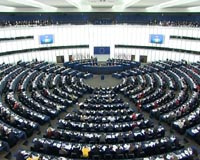| . |  |
. |
Brussels (AFP) June 8, 2009 NATO plans to cut its peacekeeping force in Kosovo by a third by January, officials and diplomats said Monday, but they insisted that troop numbers would only drop as security conditions allow. Allied defence ministers, at talks in Brussels Thursday, are expected to endorse cuts recommended by NATO top brass, which would see the Kosovo contingent KFOR slashed to 10,000 troops from around 15,000. NATO officials were at pains to point out that the alliance was not abandoning ethnically tense Kosovo, with one diplomat saying that even contingency planning does not include a "zero option" of no peacekeepers. But the diplomat said a broader phase out was possible, with troops dropping later to "something over 5,000, then something over 2,000. But for the time being there is no such thing as no KFOR at all being envisaged." A senior US official said NATO wants to move to a "deterrence presence" in Kosovo, allowing local forces to take responsibility for security there. "It is likely that the ministers will endorse that presence, which would mean a reduction of KFOR troops from about 15,000 troops today to 10,000 by January 2010," he told reporters. NATO has been tasked by UN Security Council resolution 1244 to provide security in Kosovo since it launched an air war in 1999 to stop a Serbian crackdown on separatist ethnic Albanians. But as security concerns there ease and pressure mounts on members of the 28-member military alliance to deploy troops to places like Afghanistan, nations have been calling for KFOR to be scaled back. "No decision has been taken on any change to KFOR size or posture," NATO spokesman James Appathurai said. "This will be discussed at the upcoming defence ministers' meeting. If any change is made, it will be on the basis of political and military criteria, in that order," he said. Many nations believe that NATO should now play a third-line security role, allowing local security forces to take the lead, backed by the European Union's police and justice mission in Kosovo. Spain, Britain and Lithuania have recently announced troop cuts for the Kosovo force and the draw-down is likely to evolve as security and political conditions allow. "Each subsequent step, if there is a reduction further down the road, will require positive decisions based on an evaluation of the security conditions and of the political conditions on the ground," the US official said. "We are going to move very deliberately, very gradually down the path, to make absolutely sure that as the reduction moves forward it contributes to stability rather than to instability," he said. Wednesday marks the 10th anniversary of NATO's deployment in Kosovo and the operation holds deep symbolic importance for the ethnic Albanians, who proclaimed independence from Serbia in February 2008. It has since been recognised by 60 countries including the United States and 22 of the 27 EU nations. Serbia is backed by its ally Russia in opposition to the move, which they consider a breach of international law. In Paris on a visit with Prime Minister Hashim Thaci, Kosovo's foreign minister, Skender Hyseni, welcomed NATO's decision as a sign that the territory's security forces were growing in strength. "We don't see anything dramatic in this reduction of NATO military forces, on the contrary," he told reporters. "It's a fact that speaks in favour of the climate of stability that has come to Kosovo." Share This Article With Planet Earth
Related Links Learn about the Superpowers of the 21st Century at SpaceWar.com Learn about nuclear weapons doctrine and defense at SpaceWar.com
 Analysis: Europe's elections
Analysis: Europe's electionsBerlin (UPI) Jun 8, 2009 The European Parliament is becoming more conservative after the biggest elections in European history. Voters across 27 EU countries handed center-right parties 263 seats, the most in the 736-member Parliament. Center-left parties won 161 seats, the Liberals/Democrats 80 seats and the Greens 52 seats, with the remainder going to smaller parties. Center-left groupings had campaign ... read more |
|
| The content herein, unless otherwise known to be public domain, are Copyright 1995-2009 - SpaceDaily. AFP and UPI Wire Stories are copyright Agence France-Presse and United Press International. ESA Portal Reports are copyright European Space Agency. All NASA sourced material is public domain. Additional copyrights may apply in whole or part to other bona fide parties. Advertising does not imply endorsement,agreement or approval of any opinions, statements or information provided by SpaceDaily on any Web page published or hosted by SpaceDaily. Privacy Statement |